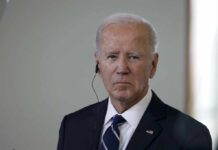
White House officials warn that failure to pass President Trump’s budget bill could leave 9 million Americans without health insurance and potentially trigger a severe economic recession.
At a Glance
- The White House projects that 9 million Americans could lose health insurance if Trump’s budget fails, raising the uninsured total to 36 million
- House GOP leaders have reduced proposed federal healthcare cuts from $880 billion to $625 billion amid internal opposition
- Economic recession fears stem from expiring 2017 tax cuts, with projections of 6.5 million job losses and 4% GDP contraction
- Speaker Mike Johnson is pushing to pass the “One Big Beautiful Act” by Memorial Day despite Republican divisions
- The 1,116-page bill includes $5 trillion in tax cuts and campaign promises like ending taxes on overtime and tips
White House Issues Warning on Budget Failure
A new White House study released on May 17 presents concerns about the impacts of failing to pass President Trump’s budget legislation. According to the report, between 8.2 and 9.2 million Americans could lose their health insurance coverage in the event of a “moderate to severe recession” triggered by the expiration of Trump’s 2017 tax cuts in 2026. This economic downturn could potentially increase the national uninsured population to approximately 36 million Americans, with job losses being a primary driver of coverage loss.
The White House Council of Economic Advisers estimates that unemployment could increase by four percentage points, resulting in approximately 6.5 million lost jobs nationwide. The study indicates that about 60% of those affected had employer-sponsored health insurance, potentially leading to 3.9 million Americans losing their coverage due to unemployment. An additional 3.3 million could lose coverage through individual marketplace plans due to affordability issues during economic hardship.
GOP Budget Revision and Healthcare Impact
House Republican leaders have been making significant adjustments to their healthcare proposals in recent weeks. Originally projecting $880 billion in healthcare savings, the plan has been revised downward to $625 billion as leadership addresses concerns from within the party. These revisions reflect the difficulty in balancing fiscal goals with potential impacts on constituents’ healthcare access.
“The likely impact of federal health-care cutbacks has diminished in recent days as House Republican leaders backed away from some of their bigger-ticket proposals, reducing the estimated savings to $625 billion from previous figures of $715 billion and $880 billion.”, said Crain’s New York.
The revised plan includes provisions to limit health insurance tax credits for non-citizens, which could significantly impact states like New York. The Empire State’s Essential Plan, which provides coverage for lower-income residents, could lose approximately $2.8 billion annually under the proposal. Additionally, provisions penalizing states for providing coverage to immigrants through state-operated health plans could cost New York between $1 billion and $2 billion in lost federal funding.
Medicaid Work Requirements and Coverage Estimates
A key component of the House GOP plan is the introduction of work requirements for Medicaid recipients. While this requirement has been postponed until January 2029 in the revised proposal, it could eventually impact hundreds of thousands of Americans. In New York alone, state officials have indicated that between 500,000 and 750,000 residents could potentially lose benefits once implemented, though many enrollees would likely be exempt or already employed.
“State officials told the Journal News that most of the state’s 7 million enrollees are either exempt or already employed, leaving between 500,000 to 750,000 vulnerable to losing benefits.”, said Journal News.
The Congressional Budget Office has provided two sets of numbers regarding potential coverage losses: one for the legislation’s direct effects (8.6 million) and another including the expiring policy (13.7 million). Democrats have cited the higher figure in their opposition to the bill, while Republicans point to the lower estimate as more accurately reflecting the legislation’s impact. These differing interpretations highlight the politically charged nature of healthcare policy discussions.
Johnson Pushes for Memorial Day Passage
Despite significant challenges within his own party, House Speaker Mike Johnson is working diligently to pass what has been dubbed the “One Big Beautiful Act” by Memorial Day. The comprehensive 1,116-page bill includes over $5 trillion in tax cuts, partially offset by spending cuts and tax code changes. A primary goal is making President Trump’s first-term tax cuts permanent to avoid the potential economic downturn projected by the White House study.
The legislation incorporates several of President Trump’s campaign promises, including ending taxes on overtime and tips, providing a $10,000 tax break on auto loan interest for American-made vehicles, and creating a tax-free “MAGA account” for children born during Trump’s second term. This ambitious package represents a significant legislative effort to implement the president’s economic vision, though its path to passage remains uncertain given divisions within the Republican caucus and opposition from Democrats.

























